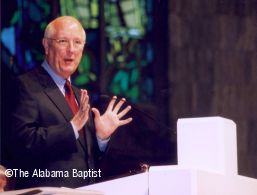First the gamblers ripped off one of Alabama’s favorite descriptions of the down-home affection most residents hold for their native state. Sweet Home Alabama is not only the title of the state’s unofficial anthem but the phrase also graces the newest edition of state license plates.
But thanks to the gambling crowd, the phrase has been sullied, dragged through the dirt of selfish efforts aimed at spreading casino-type destination gambling sites across Alabama.
Then the gamblers tried to rip off the good name of famed Evangelist Billy Graham. It seems a strange coincidence that some middle management vice president of Ronnie Gilley Properties — the force behind the Sweet Home Alabama campaign — who just happens to be named Billy Graham was made the public identity of the statewide gambling drive. More than one person has called this office in tears, saying, “Please tell me it is not true. Billy Graham is not supporting gambling.”
Gambling ads promote legalizing and taxing electronic bingo gambling. What they do not say is that the campaign is to expand gambling with these slot machines. In return for making them legal, gambling hall owners will gladly pay a tax. Each electronic gambling machine averages a $60,000 take annually, according to national studies. Taking $60,000 per machine out of a local economy in return for a few tax dollars is nothing short of a rip-off.
Public education and Medicaid are this year’s “charities of the year.” Every year, gamblers find some worthy cause to hide behind. Whatever needs money at the time or has heart appeal, the gamblers grab. They seem afraid to debate the issue straight up. Instead they want to rip off the state with smoke and mirrors. Look at this need, they say, but don’t look at us.
Gamblers talk about helping the economy. What they want to do is rip off the economy. Listen to Donald Trump, who owns destination gambling sites. Trump said, “People will spend a tremendous amount of money in casinos, money they normally would spend on refrigerators or a new car. Local business will suffer because they’ll lose consumer dollars to casinos.”
National reports estimate the $60,000 taken out of the economy by each electronic gambling machine translates into $180,000 of real impact. If the money were spent with local business, then it would be turned over from the salesman to the grocery store and so forth. Instead that $60,000 is shipped off to Las Vegas or New Jersey or wherever these major gambling companies make their headquarters. That is just another rip-off.
Gamblers talk about how much money will be generated by legalizing their sin. What they do not talk about is a cost-benefits analysis of what happens when gambling moves in. John W. Kindt, professor of business administration at the University of Illinois at Urbana-Champaign, said, “No reputable economist anywhere believes [gambling is] an economic tool.”
Why? Because legalized gambling costs taxpayers $3 for every $1 it generates in revenue for government, Kindt pointed out. Also, because for every electronic gambling machine you add, you lose one job per year from the consumer economy, he noted.
Destination gambling sites may hire workers, but within the 35-mile feeder zone for those sites, jobs disappear. That is a rip-off.
“[Gambling] actually has led to higher taxes, loss of jobs, economic disruption of nongambling businesses, increased crime and higher social-welfare costs.” That is the conclusion Kindt reached, and that is from a nationally recognized economist.
“If gambling were banned, those social costs would drop, tax revenues from consumer goods would increase and money would be pumped into the productive economic sector,” he continued.
Electronic gambling is nothing short of a rip-off of the state of Alabama by a few selfish private interests. Any legislator who says he or she does not see the downside of the two gambling bills — Sweet Home Alabama bill (Senate Bill (SB) 471 and House Bill (HB) 676) and the Greene County bill (SB 135 and HB 363) — now moving in the state Legislature simply has not done his or her homework.
It is disappointing that some local and state officials alike have sold out the general welfare of their communities and Alabama as a whole for short-term gains that will have disastrous long-term consequences. And that is from an economic evaluation to say nothing of the moral and ethical consequences such decisions have.
But the rip-off does not stop there. Gambling ads say electronic gambling machines should be regulated. Yet the Sweet Home Alabama bill gives no enforcement power to the gaming commission it would create. The ads say electronic gambling should be limited, but the bill does not do that. Instead it provides a way for destination gambling sites — casinos — to be located anywhere in the state. The Greene County gambling bill seeks to redefine bingo gambling in a way that supersedes the Alabama Constitution, and this would be done without a vote of the people. That bill also provides a way for gambling sites across the state to be linked to Greene County and be free of all local regulations.
A rip-off? It sure is.
Private interests are pushing bills that would benefit them at the expense of the general welfare of Alabama. They are doing it with smoke and mirrors and that is a rip-off, no matter how one defines it.
The Alabama Baptist will continue providing reliable information about the gambling bills now under consideration by the state Legislature, but stories in the state Baptist paper will not prevent Alabama from being ripped off by the gambling crowd. It will take action on the part of Alabama citizens — especially Alabama Baptists, who make up the largest religious group in the state. If we do not care enough to voice our opposition, then who will?
Calls to your state senators and representatives opposing the electronic gambling bills are good. Better would be a personal visit with your elected officials. Let them know you oppose the rip-off being attempted in Alabama. Let them know you oppose both the Sweet Home Alabama and Greene County gambling bills.






Share with others: